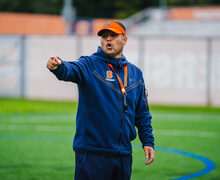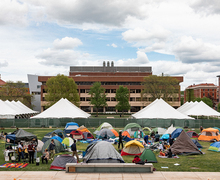SA leadership discusses plans to support SU’s marginalized communities
Will Fudge | Staff Photographer
As leaders of SA, Hastings and Golden have already taken steps toward achieving some of their goals.
The Daily Orange is a nonprofit newsroom that receives no funding from Syracuse University. Consider donating today to support our mission.
Justine Hastings and Ryan Golden know their goals for Syracuse University’s Student Association might seem unrealistic to some. But that hasn’t stopped them from putting their plans into action.
Hastings and Golden were elected SA president and vice president in April over two other campaigns. The pair ran on a platform focused on making SU more financially accessible, supporting marginalized communities, enacting the demands of #NotAgainSU and increasing accountability within SA.
Despite the coronavirus pandemic and its financial fallout for the university stalling some of their progress, Hastings and Golden have already taken steps toward achieving some of those goals.
“Even during the campaign, we were told a lot that some of our goals were very ambitious,” Hastings said. “Some will come easily. Others will take more time.”
A key component of Hastings and Golden’s action plan for the 2020-21 academic year is supporting the demands of #NotAgainSU. The movement, led by Black students, has protested SU’s handling of a series of racist incidents reported at the university last academic year. Hastings is a member of #NotAgainSU.
The pair also aims to add a student vote to SU’s Board of Trustees, make campus more accessible to students with disabilities and freeze tuition.
Even if they can’t accomplish all of their goals by the end of their term, Hastings and Golden would like to start a conversation around these measures. At the very least, Golden would like the university to show a commitment to working toward SA’s goals.
“I would really like to see a change in tone and attitude,” he said. “The concerns that we’re raising are important, and the university needs to address them in an appropriate manner.”
The duo has worked over the summer and into the fall to begin putting many of their plans into action. During summer break, Hastings and Golden helped facilitate Chancellor Kent Syverud’s signing of commitments that the university made to #NotAgainSU protesters while the movement occupied Crouse-Hinds Hall in the spring.
Syracuse University signed commitments with #notagainsu by The Daily Orange on Scribd
The commitments, which Interim Vice Chancellor and Provost John Liu announced in March, did not fulfill all of #NotAgainSU’s demands but did include the expansion of multicultural learning communities, the hiring of additional counselors and the reform of first-year seminar SEM 100.
Hastings and Golden have drafted a proposal to give students voting positions on SU’s Board of Trustees. Under their proposal, the SA president and an SA-appointed undergraduate student representative would each have half a vote, while a whole vote would go to a graduate student representative who SU’s Graduate Student Organization would appoint.
“The voice of the students needs to be one voice,” Hastings said. “(The Board of Trustees) is not going to agree to more than one in that kind of a setting.”
Hastings and Golden are also continuing SA’s efforts to bring Callisto, a third-party sexual assault reporting system, to SU. The pair met with Callisto representatives and Sheila Johnson-Willis, chief equal opportunity and Title IX officer, to discuss implementing the program at SU.
Callisto is now undergoing an accessibility review process to determine whether SU will adopt the system, Hastings said.
Hastings announced Monday that students can declare their preferred name on their SU I.D. cards, fulfilling another one of their duo’s objectives.
While they’ve made progress on some initiatives, COVID-19 has posed obstacles for Hastings and Golden in meeting a number of their goals. They created several positions over the summer dedicated to addressing the impact of COVID-19 on different student communities, including international students and students with disabilities.
“The biggest challenge so far is that, of course, and naturally, university administrators are kind of focused on COVID right now,” Hastings said. “COVID is interfering with a lot of our goals and plans, but we’re still being diligent in any way we can and being flexible.”
As part of their efforts to make SU more accessible, Hastings and Golden are working to make American Sign Language a recognized language at SU. However, because of the hiring freeze SU implemented in response to the pandemic, the university can’t hire the necessary staff members to carry out their plan, Hastings said.
The university’s decision to halt many construction projections in light of the pandemic has also made it difficult for the pair to create more dedicated spaces for marginalized student communities, she said.
SA will continue several long-term initiatives under Hastings and Golden’s administration, including offering students a free preparation course for the Graduate Record Examination and working to provide free menstrual products in bathrooms across campus.
The organization will also host a modified version of its annual Mental Health Awareness Week in October, placing an emphasis on mental health among marginalized communities on campus. Overall, Hastings would like to offer more programming this semester that highlights student organizations and offices serving marginalized student groups at SU.
SA hosted a series of events last weekend in solidarity with Friday’s March on Washington, in which thousands of demonstrators descended on the National Mall to protest racial injustice and police brutality. Hastings led a solidarity march around SU’s campus, leading students in chanting the names of Black Americans killed by police.
Despite the challenges that COVID-19 poses, the duo is excited to lead SA this upcoming semester, and they hope to see more student involvement in the organization. While New York state social distancing guidelines will prevent students from joining SA Assembly meetings in person, Hastings encouraged students to join virtually.
As leaders of SA, Hastings and Golden’s first priority is to uplift students’ voices.
“Everything I do, I try and frame it as, ‘how is it supporting students?’” Hastings said. “If I can answer that question, I move forward with 100% commitment and diligence and energy towards that.”
MORE COVERAGE:
- Justine Hastings, Ryan Golden want SU to be more affordable
- Student Association leads march against racism, police brutality
- SA will host Mental Health Awareness week among pandemic, hate crimes
Published on August 30, 2020 at 10:34 pm
Contact Mira: [email protected]





